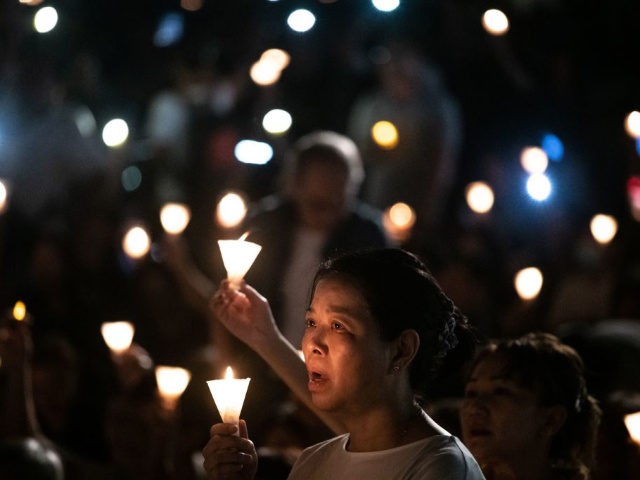Lee Cheuk-yan of the Hong Kong Alliance in Support of Patriotic Democrat Movements of China, organizer of an annual June 4 vigil to remember the victims of Communist China’s murderous crackdown on Tiananmen Square in 1989, said on Wednesday that this year’s event will be held in a socially distant manner due to extended coronavirus bans on large public gatherings.
Lee said the coronavirus restrictions are “disproportionate” to the state of the pandemic in Hong Kong and accused the Beijing-controlled government of using the emergency to suppress dissent.
“It is very obvious what they are up to. It is very clear that they had a political objective of suppressing gathering[s] in Hong Kong,” Lee said of the government restrictions, as quoted by the Hong Kong Free Press, which noted that schools are going back into session and religious gatherings are once again permitted as the coronavirus threat recedes, but public assemblies of more than eight people are still forbidden.
Pro-democracy activists also found it a little suspicious that the extended coronavirus restrictions announced on Tuesday end on June 5, lasting just long enough to stymie Tiananmen Square commemorations.
Lee said his group would still do its best to fill Victoria Park with candles on June 4, but a few people working within coronavirus social distancing restrictions would be hard-pressed to duplicate the impressive spectacles of previous years, when huge crowds filled the park for the candlelit vigil. He called on supporters to light candles wherever they were in the city.
“Because of the gathering ban, police will not let you apply to hold a gathering in any place. But as individuals, we should have the right to pay tribute,” he said, hoping for dispersed participation on such a vast scale that it becomes a “slap in the face” to Hong Kong administrator Carrie Lam and the Chinese Communist government in Beijing.
Lee acknowledged that police might not allow even the smallest and most socially distanced commemoration to be held in Victoria Park, since his applications are still pending, so it was important to have a “Plan B.”
“Instead of one point, we will do it everywhere, still with the powerful candlelight to condemn the massacre and mourn for those who died in 1989,” he vowed.
Lee called June 4 a “litmus test” for whether the Chinese Communist Party (CCP) retains any real commitment to the “one country, two systems” principle that gives Hong Kong limited autonomy, since Beijing’s subjects are strictly forbidden to discuss the Tiananmen Square massacre or question the CCP’s absurdly low “official count” of the people who died there. If Hong Kong’s autonomy still has any meaning, its people will not be silenced on June 4 the way mainland Chinese are.
“We are calling upon people in Hong Kong to ‘be water’ and continue to commemorate the massacre in their own spontaneous ways,” Lee said, quoting a famed protest slogan adapted from Bruce Lee’s martial arts teachings that urges Hong Kong dissidents to be spontaneous, decentralized, and adaptable so they can flow like water around government efforts to suppress their movement.
Lam’s administration denied allegations that the coronavirus ban has been extended to thwart demonstrations, insisting “no political considerations have ever come into play.” Lam herself accused a HKFP reporter of “bias” for questioning this assertion.
Lee spoke on Wednesday at the reopening ceremony for the June 4 Museum curated by his alliance. The museum has a new exhibit that links the Tiananmen uprising to the current protest movement in Hong Kong. The exhibit celebrates both protest movements for championing “truth, freedom, and life.”
Remarking on the new exhibit, Lee said it was important to help today’s young student protesters appreciate their moral and philosophical inheritance from the slain heroes of Tiananmen Square.
“There is no way to turn a blind eye to the authoritarian regime. In the past 31 years, what we are doing is to connect Chinese people with us, and make changes to the regime,” he declared.

COMMENTS
Please let us know if you're having issues with commenting.